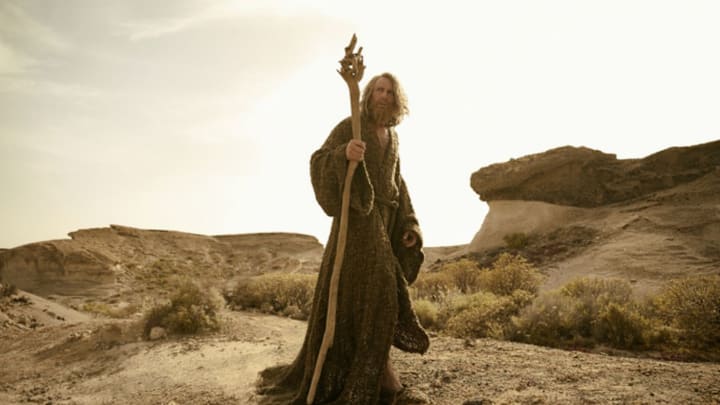The second season of The Lord of the Rings: The Rings of Power wrapped up the other week. It was an eventful finale for this Lord of the Rings prequel show. Durin IV became the new dwarven king of Khazad-dûm, the elven city of Eregion fell, and we learned that the Stranger — the mysterious amnesiac wizard we met in the first episode of the series — is actually a younger version of Gandalf, something a lot of people probably guessed from the jump.
The Rings of Power is set during the Second Age of Middle-earth, thousands of years before the events of the main series. Including the wizards in this story is a little suss to Lord of the Rings fans, since in his book The Silmarillion and in the appendices to the originaly trilogy, author J.R.R. Tolkien says that the wizards arrive in Middle-earth during the Third Age, not the Second. At the same time, it's true that Tolkien's thoughts on things changed throughout his life; in later years, he considered having at least some of the wizards arrive during the Second Age.
So there are parts of the Tolkien canon that are flexible. But speaking about The Rings of Power in an interview posted on the show's Twitter page, Dr. Corey Olsen takes things to another level. "There's no such thing really as canon in Tolkien," he says. "Tolkien's ideas were ever evolving."
He’s come to spread hope to Middle-earth. The Tolkien Professor and Varking dive deep into Tolkien’s lore on Gandalf. pic.twitter.com/vR0twBBM6C
— The Lord of the Rings on Prime (@TheRingsofPower) October 3, 2024
Is there "no such thing" as canon in the works of J.R.R. Tolkien?
If we're being very generous to Dr. Olsen, we could say that he's referring only to elements of Tolkien's mythology that weren't set down and established in works published during his lifetime; The Silmarillion, one of the places where the wizards are mentioned, wasn't published until after his death, his notes edited and compiled by his son Christopher.
But even then, saying there's "no such thing" as canon in Tolkien's works seems like a massive stretch. Tolkien was very thorough when it came to crafting his stories, detailing histories and even creating entire languages. The specificity and particularity of his stories is a big part of the reason they've endured in the imaginations of fans for so long.
Claiming that there's "no such thing" as canon in Tolkien seems like a reactionary argument the people behind The Rings of Power have to make to avoid confronting the fact that they've changed Tolkien's canon in pretty seismic ways. For instance, in Tolkien's reckoning, the Second Age takes place over thousands of years. But in The Rings of Power, everything is collapsed into what feels like the space of a few years or even months. Saying that there's "no such thing" as canon gives The Rings of Power team license to do this, even though it's extremely hard to believe that Tolkien would move on a point this big.
The argument seems self-serving to me. Even Olsen contradicts himself a bit. He cites a line that Gandalf says in The Lord of the Rings books: "To the east I go not." That seems to contradict the plot they've come up with for the Stranger in season 2, where he travels to the eastern land of Rhûn. But according to Olsen, by "the east," Gandalf meant Mordor. "He meant, 'Don't expect me to go throw down with the dark lord at the gates of Barad-dûr.'"
So on the one hand, there's "no such thing" as canon in the works of J.R.R. Tolkien. But in the same breathe, Olsen argues that there's a correct, canonical interpretation of the line "to the east I go not." And that interpretation just happens to be the one that allows The Rings of Power to do the opposite of the common sense reading of that line? Smells like nonsense to me.
I don't even mind that The Rings of Power goes pretty far afield of Tolkien's source material; if the show is fun, and this one generally is, I'm happy. But I wish the producers wouldn't front like this. Just say you're changing things. It would feel more honest.
To stay up to date on everything fantasy, science fiction, and WiC, follow our all-encompassing Facebook page and Twitter account, sign up for our exclusive newsletter and check out our YouTube channel.
